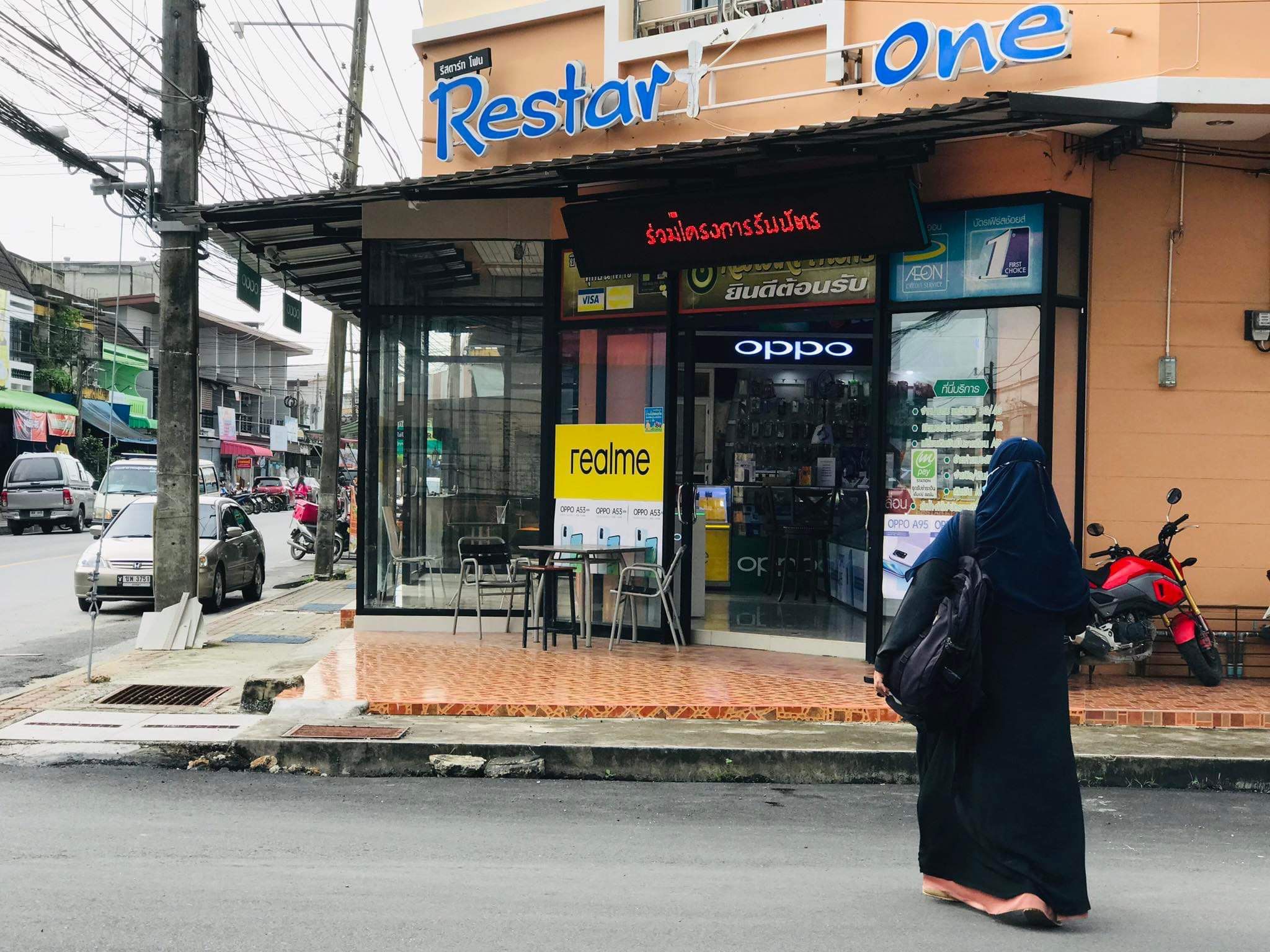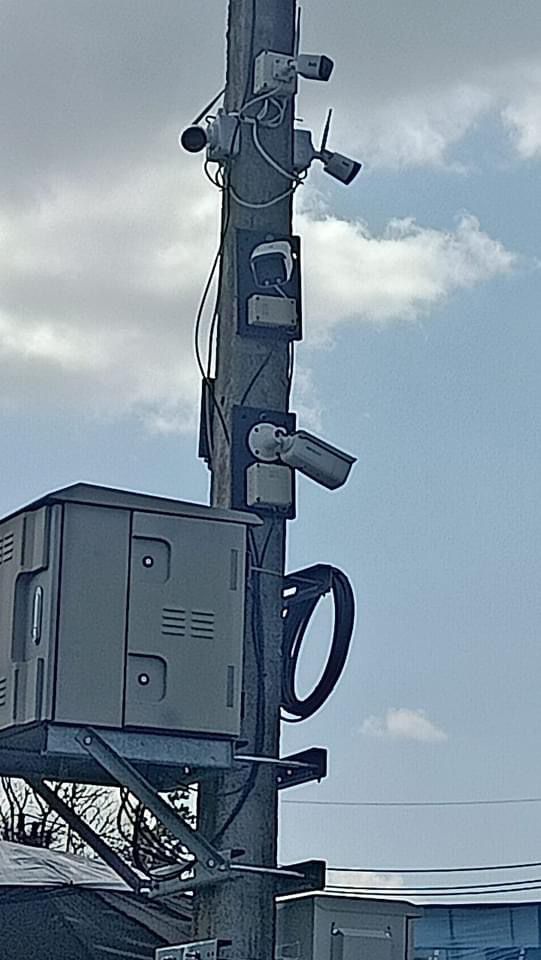At first, Haslina Awae was willing to stop using a phone to avoid providing a scan of her face to the Thai government.
Awae and other residents of Thailand’s Deep South, which comprise the three southernmost Malay-Muslim majority provinces of Narathiwat, Pattani and Yala, were required to hand over their biometric data before 30 April 2020 or have their phone signals cut. This policy, known as Song Chae or “Two Shot,” applies to the Deep South and four Muslim-heavy districts in an additional province. It does not apply to the rest of predominantly Buddhist Thailand.
Awae says the Two Shot policy violates her rights and creates an unjust burden disproportionately affecting Muslims.
“When I didn’t have a phone, I had to be extremely dependent on others,” said Awae, a Muslim resident of Pattani. “It became a big inconvenience for me when I was outside because my family was worried when they were not able to contact me.”
The Deep South, under a patchwork of restrictive martial laws and emergency decrees since 2004 following the revival of a violent, separatist insurgency, has been in conflict with the Kingdom of Thailand since the early 20th century. Human rights groups view the biometric data requirement as one of the latest in decades of abuses committed against the Deep South in the name of national security.
Throughout the rest of Thailand, citizens only have to submit their name, address and ID card to receive a SIM card from the National Broadcasting and Telecommunications Commission (NBTC).
This requirement should also be sufficient for residents of the Deep South to acquire SIM cards, argues Preeda Napkiew, a lawyer for the Cross Cultural Foundation, a Thai NGO which filed an ongoing lawsuit against the NBTC in 2020. The lawsuit is supported by Deep South-based NGO Jaringan Mangsa Dari Undang-Undang Darurat (JASAD), whose founder Abdulloh Ngoh is also the lead plaintiff.
Ngoh has not been able to receive a signal on his SIM card for more than a year because he did not submit to a facial recognition scan. Instead, he relies on WiFi and his wife’s SIM to stay connected, though he said it is cumbersome.
“In this area, our rights have always been violated,” Ngoh said. “If we continue to let this happen, we’ll always be victims.”
The NBTC, which did not respond to requests for comment from the Globe, has said in response to the lawsuit that the loss of phone service for those refusing to provide biometric data occurred by order of government security forces, according to the CrCF. The biometric data requirement has been justified in statements by the Thai government as a way to reduce the use of mobile phone activated bombs, while also making it easier to track and detain suspected insurgents.
Approximately 300,000 people out of more than 1 million eligible have declined to provide facial scans to the NBTC, CrCF director Pornpen Khongkachonkiet said.
A face scan is highly personal and citizens should have the right to withhold this information from the government without suffering undue consequences, Ngoh and his lawyer argue.
The UN declared in 2016 that internet access, which the biometric data policy impedes, is a human right. But the biometric data policy is a continuation of more than a century of heavy-handed Thai rule over the Deep South, activists and academics say.

The clashes in the Deep South originated in the early 20th century when the region bordering what is now Malaysia was forcibly integrated into the predominantly Buddhist, ethnically Siamese Thai Kingdom, political science researcher and lecturer Dr. Paul Chambers of Naresuan University said.
The state then spent decades imposing Thai-centric policies onto the region, including requiring schools to teach in Thai instead of the native Malay dialect, Chambers said.
Armed Malay-Muslim separatist groups continue to a push for greater autonomy. The ensuing violence and crackdown on dissent has led to more than 7,000 deaths in the Deep South since 2004, according to monitoring group Deep South Watch.
Today, the Internal Security Operations Command (ISOC), an army-dominated agency run by the prime minister that oversees domestic security, effectively governs the Deep South with enhanced powers.
Even within the context of the military junta running Thailand, the emergency decrees and martial law across the Deep South render “no justice, no accountability and no transparency,” Chambers said. ISOC and other security forces “are able to prosecute war as they see fit, even if it means violating the rights of local people.”
I’m afraid of the information being misused”
Nur-Sikeen Yosoh, JASAD coordinator
An ISOC spokesperson did not respond to questions submitted by the Globe.
Before the biometric data requirement, Awae and her family were already impacted by ISOC policies. Her father was once held in a military camp, where Amnesty International said detainees can be tortured, motivating Awae to support other detainees as a JASAD volunteer.

The work required a lot of travel. After several months without a working phone, Awae decided she was willing to give up her biometric data, even though it made her feel as if she was a suspect in an unstated crime.
“I felt like I didn’t have a choice,” Awae said. “I felt very scared of what would happen to me afterwards. Now, [my data] can be used as evidence for false claims.”
Many people worry that providing facial scans increases the risk they could be arbitrarily or wrongly detained by the military, said Nur-Sikeen Yosoh, a JASAD coordinator based in Pattani province.
The consequences of drawing the Thai military’s attention can be deadly. In one 2004 case, 78 protestors suffocated to death after being detained and packed into a truck for transport to a Deep South military complex. Extrajudicial killings of suspected insurgents remain commonplace and many people in the Deep South subsequently harbour a distrust of the Thai state, Yosoh said.
“When the [biometric data] programme was first implemented, not a lot of people went to register,” Yosoh said. “But as Covid-19 started to spread, it created a new need to use SIM cards in people’s daily lives. It created more pressure for people to comply with the state’s regulations.”
There are already more than 8,000 cameras installed across the Deep South linked to a surveillance system overseen by security forces, according to the Bangkok Post. Academics and analysts have suggested the Deep South biometric data policy is being used to test technology that may eventually be employed nationwide.
Biometric data is stored in a database managed by the military’s Southern Border Provinces Administrative Centre. There is virtually no transparency into the management of the database, activists say.
“I’m concerned about the security of the information database,” Yosoh said. “Who will ensure that it is not used for other purposes? I’m afraid of the information being misused.”
Some Deep South residents continue to resist the biometric data requirement.
Arief, whose full name has been withheld to protect his identity, has not registered his biometric data due to privacy concerns, though he worries about how security forces perceive this choice.
“From my perspective, it was a clear violation of my rights,” he said. “But others thought maybe I had malicious intentions – ‘Is he a terrorist? Why would he not obey?’”
After his phone signal was cut, Arief relied on WiFi and mobile hotspots from friends to access the internet. Frustrated, he found a loophole in the state’s policy by ordering a non-registered SIM card online from Bangkok.
Most people are unaware of the loophole, accepting the biometric data requirement without complaint or protest because of an ongoing “numbness” to the loss of their rights after years of government and military abuse, Arief said.
“Citizen rights are regularly violated so much that the overall mood of people is that they just comply,” he said. “No one wants to get in trouble with the government so they do whatever they’re told.”
The onslaught of restrictive and invasive measures such as the biometric data requirement are less effective at securing peace in the long term because they are yet another imposition by the government through the military. People in the region need to see sincere diplomatic outreach and concessions, Arief said.
“As long as the military is leading the governance, I don’t think there is a genuine interest in listening to the voices of people in the area,” he said.
Additional Reporting by Wanpen Pajai.


